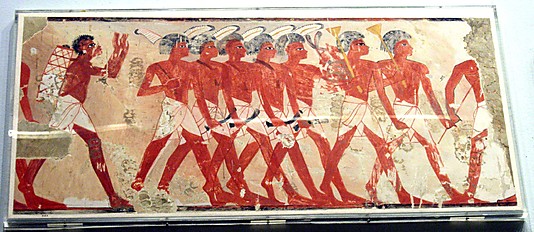Pan-Africanism, the idea that peoples of African descent have common interests and should be unified. Historically, Pan-Africanism has often taken the shape of a political or cultural movement. There are many varieties of Pan-Africanism. In its narrowest political manifestation, Pan-Africanists envision a unified African nation where all people of the African diaspora can live. (
African diaspora refers to the long-term historical process by which people of African descent have been scattered from their ancestral homelands to other parts of the world.) In more-general terms, Pan-Africanism is the sentiment that people of African descent have a great deal in common, a fact that deserves notice and even celebration.
History of Pan-Africanist intellectuals
Pan-Africanist ideas first began to circulate in the mid-19th century in the United States, led by Africans from the Western Hemisphere.
The most important early Pan-Africanists were Martin Delany and Alexander Crummel, both African Americans, and Edward Blyden, a West Indian.
Those early voices for Pan-Africanism emphasized the commonalities between Africans and black people in the United States. Delany, who believed that black people could not prosper alongside whites, advocated the idea that African Americans should separate from the
United States and establish their own nation. Crummel and Blyden, both contemporaries of Delany, thought that Africa was the best place for that new nation. Motivated by Christian missionary zeal, the two believed that Africans in the New World should return to their homelands and convert and civilize the inhabitants there.
Although the ideas of Delany, Crummel, and Blyden are important, the true father of modern Pan-Africanism was the influential thinker W.E.B. Du Bois. Throughout his long career, Du Bois was a consistent advocate for the study of African history and culture. In the early 20th century, he was most prominent among the few scholars who studied Africa. His statement, made at the turn of the 20th century, that “the problem of the twentieth century is the problem of the color line” was made with Pan-Africanist sentiments in mind.
For Du Bois, “the problem of the color line” was not confined merely to the United States and its “Negro Problem.” (During those years, it was common for many in the United States to refer to the problem of African Americans’ social status as the “Negro Problem.”) Du Bois’s famous statement was made with the clear knowledge that many Africans living on the African continent suffered under the yoke of European colonial rule.
Among the more-important Pan-Africanist thinkers of the first decades of the 20th century was Jamaican-born black nationalist
Marcus Garvey. In the years after
World War I, Garvey championed the cause of African independence, emphasizing the positive attributes of black people’s collective past. His organization, the
Universal Negro Improvement Association (UNIA), boasted millions of members, envisioning and then making plans for a return “back to Africa.” Garvey’s Black Star Line, a shipping company established in part to transport blacks back to Africa as well as to facilitate global black commerce, was ultimately unsuccessful.
From the 1920s through the 1940s, among the most-prominent black intellectuals who advocated Pan-Africanist ideas were
C.L.R. James and George Padmore, both of whom came from Trinidad. From the 1930s until his death in 1959, Padmore was one of the leading theorists of Pan-African ideas. Also influential were
Léopold Senghor and
Aimé Césaire, who were natives of Senegal and Martinique, respectively. A disciple of Padmore,
Jomo Kenyatta of
Kenya, was also an important figure in Pan-Africanist thought.
Despite their origins outside the United States, such Pan-Africanist thinkers drew many of their ideas from African American culture. Furthermore, James and Padmore resided in the United States for significant periods of time. An exchange of ideas about Africa and peoples of African descent took place between those intellectuals and African Americans, with African Americans taking the lead. It was, in many ways, a black Atlantic intellectual community. Senghor and Césaire, in particular, were greatly influenced by Du Bois and by several
Harlem Renaissance writers, especially
Countee Cullen,
Langston Hughes, and
Claude McKay. In the 1930s and ’40s, the African American actor and singer
Paul Robeson was also a significant contributor to the continuing exchange of ideas.
By the late 1940s the African American intellectual leadership of the movement had receded, with Africans now taking the lead. That was due in part to the leftist or communist sympathies of many Pan-Africanist advocates, as in the late 1940s and early ’50s, the United States was in the midst of a Red Scare, when Americans with communist affiliations or sympathies were actively persecuted and prosecuted. The most-important figure of this period was
Kwame Nkrumah of
Ghana, who believed that European colonial rule of Africa could be extinguished if Africans could unite politically and economically. Nkrumah went on to lead the movement for independence in Ghana, which came to fruition in 1957. Many African Americans cheered those developments in Africa.
Pan-Africanist cultural thinking reemerged with renewed force in the United States in the late 1960s and ’70s as one of the manifestations of the Black Power movement. By the early 1970s it had become relatively common for African Americans to investigate their African cultural roots and adopt African forms of cultural practice, especially African styles of dress.
In subsequent decades perhaps the most-prominent current of ideas that can be called Pan-Africanist has been the
Afrocentric movement, as espoused by such black intellectuals as Molefi Asante of Temple University, Cheikh Anta Diop of Senegal, the American historian
Carter G. Woodson, and
Maulana Ron Karenga, the creator of
Kwanzaa. With its roots in the 1960s,
Afrocentrism gained particular popularity in the United States during the 1980s. The movement emphasizes African modes of thought and culture as a corrective to the long tradition of European cultural and intellectual domination.
The Pan-African Congress movement
During the 20th century advocates of Pan-Africanism made many efforts to institutionalize their ideas and to create formal organizations to complement the work of Pan-Africanist intellectuals. The first meeting designed to bring together peoples of African descent for the purpose of discussing Pan-Africanist ideas took place in
London in 1900. The organizer was Henry Sylvester Williams, a native of Trinidad. The meeting was attended by several prominent blacks from Africa, Great Britain, the West Indies, and the United States.
Du Bois was perhaps the most-prominent member of U.S. delegation.
The first formal Pan-African Congress (the first to bear that name) took place in 1919 in Paris and was called by Du Bois. That meeting was followed by a second Pan-African Congress two years later, which convened in three sessions in London, Brussels, and Paris. The most-important result of the second Pan-African Congress was the issuance of a declaration that criticized European colonial domination in Africa and lamented the unequal state of relations between white and black races, calling for a fairer distribution of the world’s resources. The declaration also challenged the rest of the world to either create conditions of equality in the places where people of African descent lived or recognize the “rise of a great African state founded in Peace and Goodwill.”
After a third Pan-African Congress in 1923 and then a fourth in 1927, the movement faded from the world picture until 1945, when a fifth Pan-African Congress was held in Manchester, England. Given that Pan-Africanist leadership had largely transferred from African Americans to Africans by the mid-1940s, Nkrumah, Kenyatta, and Padmore played the most-prominent roles at that congress. The only African American present was Du Bois.
With the coming of independence for many African countries in the decades following
World War II, the cause of African unity was largely confined to the concerns of the African continent. The formation of the Organization for African Unity (OAU) in 1963 solidified African leadership, although a sixth Pan-African Congress was held in Dar es Salaam, Tanzania, in 1974. A successor organization to the OAU, the
African Union (AU), was launched in 2002 to further promote the social, political, and economic integration of Africa.
Calls for Pan-Africanism could still be heard in the United States at the turn of the 21st century, but by then the movement had generally come to stand for the unity of the countries on the African continent, especially sub-Saharan Africa.















 Are you kidding me? Haile Selassie? Kwame Nkrumah?
Are you kidding me? Haile Selassie? Kwame Nkrumah?












